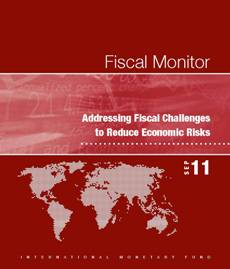Posted by Martine Guerguil

While fiscal accounts in many advanced economies have strengthened in the last couple of years, financial markets remain anxious about the ability of country authorities to reduce public debt and deficits while supporting economic activity and employment. This is one theme of the latest issue of the IMF’s flagship fiscal publication, the Fiscal Monitor.
The slower-than-expected recovery makes the challenges particularly acute in major advanced economies. Should the macroeconomic environment deteriorate substantially, countries with more fiscal space could choose a more back-loaded profile of adjustment toward unchanged medium-term targets to help support the economy; countries under severe market pressure have no option but to maintain their fiscal adjustment plans.
More specifically, although many countries in the euro area have made good progress in reducing high deficits and specifying medium-term plans and have committed to enhancing fiscal institutions, markets remain concerned about fiscal sustainability. The priority is thus to bolster confidence and credibility through a combination of steadfast implementation of fiscal decisions and pro-growth measures, adequate financing, and the strengthening of the regional crisis management framework.
In the United States and Japan, where borrowing costs remain extremely low, the immediate priority is to commit to a credible medium-term plan to resolve these countries’ unsustainable debt dynamics. Low interest rates reflect in part structural factors, such as the large share of domestic debt holders and the relatively stable investor base. However, the widening crisis in the euro area shows how swiftly market confidence can weaken and underscores the need to address fiscal vulnerabilities promptly.
While conditions in emerging economies remain generally healthier than in advanced economies, risks in some may be on the rise and continued fiscal adjustment remains appropriate. To reduce their vulnerability to possible negative spillovers from emerging markets, those economies facing high debt ratios and gross financing needs have to make faster progress in strengthening fiscal fundamentals. In several other emerging economies, inflation pressures are building up and current account deficits are widening, suggesting that they are operating at full capacity, and that fiscal tightening would be appropriate. Should downside risks to growth due to developments in advanced economies emerge, however, those emerging markets will low debt and deficits could slow consolidation to provide support to domestic consumption.
Low-income countries made good use of fiscal buffers during the crisis, but now face the challenge of rebuilding them while addressing spending needs. High food and fuel prices have created substantial spending pressures in many low-income countries. Many have so far managed to address social needs without damaging their fiscal positions, but a sustainable response will require better targeting of measures and a willingness to unwind them should global prices decline. Long-standing fiscal challenges persist, with one-third of low-income countries in debt distress or under high debt sustainability risk. Measures to raise potential growth will be key to addressing these conditions, with increased investment to enhance infrastructure needed in many.
In sum, despite some progress, most countries continue to face significant fiscal policy challenges at a time of high uncertainty. A failure to respond to these challenges promptly and decisively, and to maintain clear and consistent communication, courts the risk that investor concerns will become self-fulfilling, with rising interest rates depressing growth prospects and increasing pressures on the budgets. The results could prove far more difficult and costly to contain than they might have been to prevent. These risks cannot be ignored, and action to address them cannot be delayed.
Note: The posts on the IMF PFM Blog should not be reported as representing the views of the IMF. The views expressed are those of the authors and do not necessarily represent those of the IMF or IMF policy.






